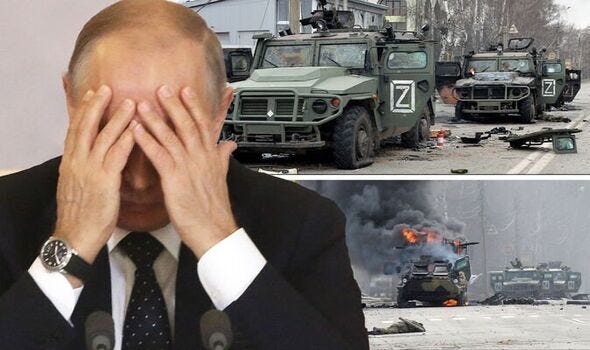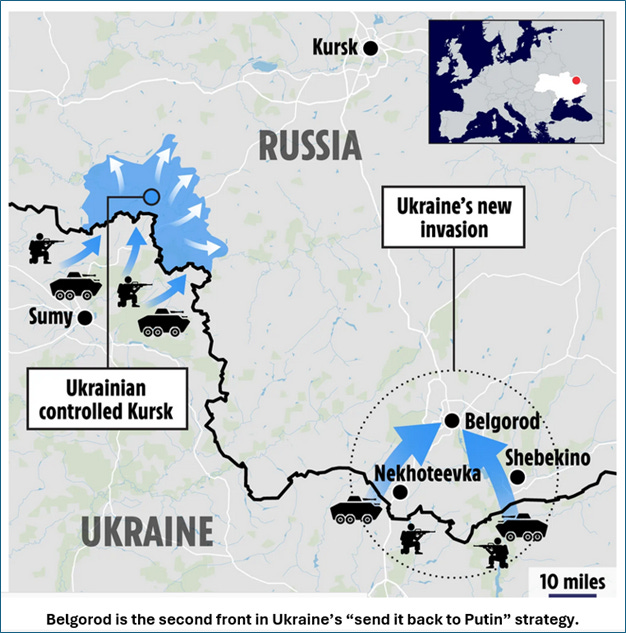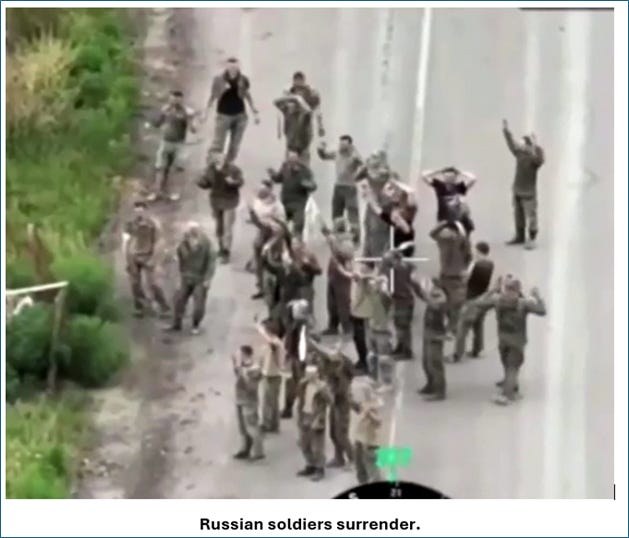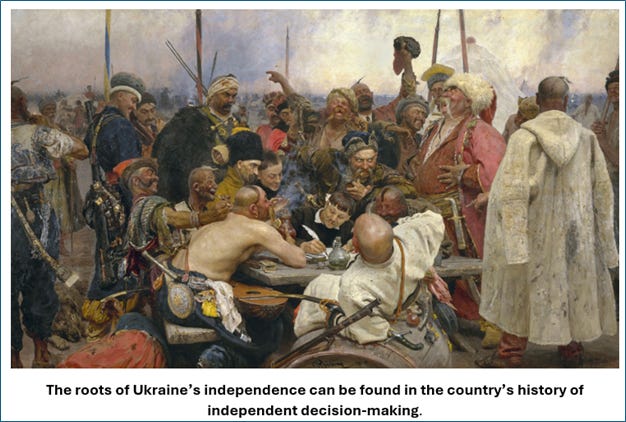Putin Finds Out Why Democracies Win 80% of Their Wars
And he gives himself a deadline he did not need to meet
Democracies win about 84% of their wars against autocracies. There is a reason, and it shows why Ukraine’s move into Kursk is so successful.
If Putin had read the book “Democracies At War”, he would know that open societies win because they emphasize individuality within democratic societies. This means that their soldiers fight with greater initiative and superior leadership.
Ukraine’s move into Kursk is an exemplary example of this kind of initiative, both at the strategic level and at the tactical on-the-ground level. The move has frightened Putin so much that he has arbitrarily given his commanders a deadline of October 1st to drive the Ukrainian forces out.
This puts him under a hammer, and jams his forces into a narrow gate that limits their response options.
Ukraine’s surprise incursion into Russia's Kursk border region was not a one-off stunt; Ukraine has also crossed the border towards Belgorod, some 150 km from Kursk. The Governor of Belgorod said that everything was under control. Governor Gladkov wrote in a Telegram message: "Go down to the basement. Stay there until you receive the signal 'all clear missile danger.'"
About 11,000 people have been evacuated from the region thus far.
The double move has stunned entire the Russian military and come as a “slap in the face” to Putin personally.
In the meantime, Putin has robbed Russia of the ability to recruit enough soldiers to do the job.
In fact, he won’t even acknowledge that the incursion is a failure by the Russian army to hold the border, or by Russian security to alert the army. He merely described the incursion as a “large-scale provocation" without commenting on the Russian army’s ability to prevent it. It is a “situation” with “circumstances.”
“Provocation” is an interesting word to describe the defensive action of a country that you have attacked. Surely the original Russian invasion was the “provocation”?
But we are not gifted with the strategic insights of the man who almost lost his kingdom to a group of Wagner rebels who drove, unopposed, within a few hours of Moscow.
Wagner Group exists because Putin has a manpower shortage. His unconstrained policies of war around the world have put a drain on his resources, and Wagner still exists to fight those foreign wars…though it no longer operates in Russia itself.
Now Putin has scrambled together a mish-mash of border guards, national guards, security units and regular army troops, plastering them into the holes in the dike of Kursk, trying to keep the Ukrainian flood at bay.
Ukraine recaptured the battlefield initiative by surprising Russian troops with a first-ever advance into PutinLand. Why they were surprised is unclear, but had more to do with conventional Russian expectations than with Ukraine’s secret preparations. Local Russian commanders told the Kremlin a month ago the ‘the Ukrainians are coming’.
Lieutenant-General Ben Hodges, retired commander of the US Army in Europe, said the Russian reaction swung between “slow” and “chaotic”:
“You’ve got a mix of border guards, national guard, FSB and regular army and local authorities, and it’s not clear who’s responsible.”
Russia wanted to destroy Ukraine but war has “returned to its home”, said Ukrainian President Zelensky.
Posting a message from a deserted, forested area a “few kilometres” from where Ukrainian forces crossed into Russia, he promised that Russia will “know what retribution is.”
“What the enemy brought to our land has now returned to his home”.
He called Putin a “sick old man from Red Square who constantly threatens everyone with the red button”.
Putin’s announcement that Ukrainians would be evicted from Russian land by October 1st is how he thinks things get done. A strongman just points and yells. Putin doesn’t have to explain anything or face any responsibility for his decisions. Pointing and yelling are the only things necessary to be a competent leader in the minds of Russians. He does not have to answer for the people who get killed; he has never cared about casualties in his wars in Chechnya or Georgia or Syria.
Today Putin’s panic has nothing to do with the deaths of others. Instead he knows that he has never been seen to be this weak, and it seems like he is unable to resolve the Kursk issue. Influential people must be questioning whether Putin is still the most suitable leader; they would be evaluating the potential success of a coup.
It was a huge risk for him to put a deadline on this. He’s publicly promising to get back what he should never have lost in the first place. And if he fails, it’ll be even more acutely his failure.
He has effectively drawn a red circle on the map and said “watch me!”
What is he planning on doing? Send in more poorly armed and trained conscripts? Bomb his own villages and cities?
But in establishing a deadline, he really had no choice. He is the dictator; he had to show that he was in charge of the situation.
In fact, he continues to leak power to outside influences.
Russia itself is oozing power away, and Ukraine is gaining.
European Commission President Ursula von der Leyen has praised Ukraine for “moving at incredible speed towards joining the European Union”.
“Europe will always be at Ukraine’s side because Ukraine is Europe. Your freedom is our freedom. Your security is our security…And now you are moving at incredible speed towards joining the European Union. We have been standing with you since day one and we will continue to do so for as long as it takes. Slava Ukraini [glory to Ukraine].”
The first round of formal accession negotiations was held a few months ago.
While Europe is counting down to Ukrainian membership, a Russian campaign has to be very careful, and here we see a subtle strength of the Ukrainian plan.
European countries like Austria, Hungary and Slovakia still buy gas from Russia. Hungary and Slovakia both have pro-Moscow ties. Russia offers cheaper gas as a quid pro quo to politically sympathetic governments. This is central to Russian foreign policy – a way to split the EU and block military and financial support for Ukraine. Without Russian gas, the pro-Russian leaders would have fewer incentives to support Russian interests.
All of it flows through the town of Sudzha.
Sudzha is in Kursk, and Ukrainian troops now occupy it.
An average of 42 million cubic metres (1.5 billion cubic ft) of Russian gas flows through that pipeline every day. If the flow stopped, Russia would lose some $4.5-billion annually, plus its political influence.
From Sudzha, the gas transits in the direction of Slovakia, where it forks off, one of the branches going to the Czech Republic, the other to Austria.
While the share of Russian gas as part of total European imports has more than halved from 38 percent in 2021 to 15 percent in 2023, it is still important to areas that support Russia. Those countries have so far refused to provide air defences to protect Ukraine’s energy infrastructure and are, therefore, propping up a major revenue stream for Russian military spending.
The overall flow of gas, BTW, has been cut because European nations have started a big move into renewable energy. What Russia has lost in this war will be forever lost. Russian gas has already dropped from 40% to 8% of the total being imported into Europe.
Ukraine’s commitment to let gas flow to Europe through Sudzha ends in December of this year, and with its hand no on the controls, it could conceivably cut that flow off early. Ukraine has already signalled that it will terminate the flow in December.
Early in 2025 there will also be a European ban on shipping Russian Liquified Natural Gas (LNG).
Putin’s essential problem is that he is an autocrat trying to pull his country together to fight against a democracy.
As noted, fully autocratic countries have flaws that make them really bad at warfare:
Authoritarian rulers tend to prefer military leaders who respond positively to their demands and do not provide or even obfuscate negative feedback. Putin fell fowl of this when he was planning the original invasion of Ukraine. No one told him it was a bad idea; no one showed him that Ukraine’s military had vastly improved in the year leading up to the invasion. This destroys any corrective feedback loop which ought to have fixed negative performance in military units.
Authoritarian leaders are a suspicious, paranoid bunch whose fear of overthrow means they tend to promote individuals for whom friendliness and certainty of loyalty may supersede actual leadership or military competence; this likewise frequently flows down to officers beneath them. General Valery Gerasimov was on the southern front when Ukraine attacked in the north; he had no idea that the attack was coming. Putin was not happy,
Even among forces commanded by loyal units, authoritarian leaders tend to limit the independence and proactivity of any particular military formation. All of these points combine to produce formations which may parade or carry out choreographed drills well, but freeze and fail to adapt to dynamic battlefield experiences. Ukrainian formations are trained to operate on their own, taking initiative.
Authoritarians also tend to pit their subordinates and subordinates' fiefdom-like organizations against each other in competition for favor, resources, and promotion; this serves to create a check against any one subordinate gaining too much influence or power, but also creates a hostile and silo-ized environment in which units, forces, and entire elements of government do not cooperate for fear of empowering a rival.
Authoritarian systems are also weak in the factors of mobilisation, supply chains, understanding of terrain, equipment, knowledge of the enemy, and how politically motivated one can be.
On a completely different notes, authoritarian/autocratic nations tend to produce oppressed and expatriate populations who are all too happy to provide information, know-how, and intelligence to hostile nations; conversely, they also tend to create hostility in populations they are attacking or conquering.
Putin is now scrambling to find enough men to fill the ranks. He was forced to raise recruitment bonuses in order to avoid a repeat of his unpopular mobilization measures. It does not seem to be working.
He himself is once again demonstrating an inability to face adversity. Time and again he has been paralysed when action was needed. During the COVID crises, he only addressed the nation briefly twice and went to the (coronavirus) hospital in Kommunarka. But he neither gave his own assessments of the crisis nor proposed a plan of action but limited himself to scattered measures and general words.
When the nuclear submarine Kursk sank in the Barents Sea he stayed in his Black Sea retreat and turned down all Western offers of aid to the stricken sub. It went down, incidentally, because antique military equipment went bad; an onboard torpedo exploded. Putin eventually met with the relatives of the 118 victims as a media storm erupted over his absence — and the meeting did not go well. Then, in 2018, he was criticized for a sluggish response to a massive shopping mall blaze in the Siberian city of Kemerovo that left at least 64 dead, 41 of them children. After the disaster, he was accused by bereaved families of repeating the same mistake. He also fumbled the terror attack on the theatre near Moscow earlier this year – which Biden, President of a democracy, had warned him about and whose advice he angrily rejected.
It seems that a democracy can find out things about your own country that an autocrat does not know.
If Putin lived in a democracy he would have been fired two decades ago.
Earlier in the war, Ukrainian troops captured Kherson in southern Ukraine. Putin was not present at the announcement of the retreat, distancing him from both an embarrassing defeat and the decision to retreat that only he could have made.
Command paralysis is a death-sentence in an autocracy.
Russia’s deficiencies are more deeply rooted than many pundits had suggested.
Moscow started the war with enough weapons but too little attention paid to logistics—spare parts, food, and transport. It meant long vulnerable supply lines that make offensive operations clumsy and detectable. Junior officers do not receive training in taking the initiative, so responses to the supply chain issue are slow. Enlisted soldiers are poorly paid and poorly trained – factors which matter a great deal on offensive operations.
As an article on Russia’s armies said well: “Two Russian armies invaded Ukraine: one a small, professionalized, and modernized force with experience in smaller, lower-intensity conflicts; the other, a larger, primarily conscript force with little operational experience. The defining characteristic of Russia’s first year of war in Ukraine was the destruction of that first army outside of Kyiv and in the vicinity of Kharkiv and Kherson.”
The destruction of the second army is being accelerated by “Putin’s Box” – a trap whereby he needs to show initiative against a democratic army that thrives on fast decisions made by local troops. Anything Putin does will merely accelerate the destruction of his own army.
Their destruction leads to the existential failure of his presidencies.
And the estimates are that Putin will now need at least 50,000 men to re-take the ever-expanding Kursk pocket. Those are men he does not have – unless he pulls them from the southern battle zones.
That is a strategic shift in resources that Ukraine could not have leveraged if they had stayed in the south and gone on a blind defence. The Ukrainians know they cannot succeed in positional warfare. They had to find a way to restore fluidity to the battlefield. Fluidity where troops from a democracy can win.
That is the real value of Ukraine’s attack on Kursk. It has shown the Russians that the grinding style of their current warfare is obsolete. They have reason to be afraid of the future - where democracy waits, both on and off the field.
Innovation will decide the fate of this war. It is not looking good for Russia.
Kursk has unchained Ukraine from ‘patterned war’. It has restored the country’s belief that it can win. And it has toppled Putin’s remaining image as a competent war commander.
The main pillar of Putin’s power has been pulverized.
And Putin should have seen it coming…and seen that he only had a 16% chance of beating a democracy.
Even in his desperate world of chance, those are pretty slim odds.






"If Putin lived in a democracy he would have been fired two decades ago." - Barry Sanders
Thanks for the grin, Barry.
and ... Oh Yeah ... You KNOW I am going to be passing this one around. Don't be surprised if circles its way back to you down the line somewhere.
Pete
Thanks for this informative article